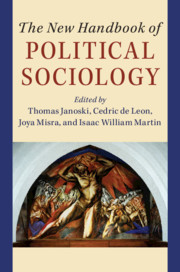Book contents
- The New Handbook of Political Sociology
- The New Handbook of Political Sociology
- Copyright page
- Dedication
- Contents
- Tables
- Figures
- Contributors
- Acknowledgments
- Introduction
- I Theories of Political Sociology
- II Media Explosion, Knowledge as Power, and Demographic Reversals
- 10 “Old” Media, “New” Media, Hybrid Media, and the Changing Character of Political Participation
- 11 The Sociology of Official Information Gathering
- 12 The Dark and Light Sides of Big Data
- 13 States, Parties, and Expertise
- 14 Toward a Political Sociology of Demography
- III The State and Its Political Organizations
- IV Civil Society: The Roots and Processes of Political Action
- V Established and New State Policies and Innovations
- VI Globalization and New and Bigger Sources of Power and Resistance
- Index
- References
13 - States, Parties, and Expertise
from II - Media Explosion, Knowledge as Power, and Demographic Reversals
Published online by Cambridge University Press: 22 February 2020
- The New Handbook of Political Sociology
- The New Handbook of Political Sociology
- Copyright page
- Dedication
- Contents
- Tables
- Figures
- Contributors
- Acknowledgments
- Introduction
- I Theories of Political Sociology
- II Media Explosion, Knowledge as Power, and Demographic Reversals
- 10 “Old” Media, “New” Media, Hybrid Media, and the Changing Character of Political Participation
- 11 The Sociology of Official Information Gathering
- 12 The Dark and Light Sides of Big Data
- 13 States, Parties, and Expertise
- 14 Toward a Political Sociology of Demography
- III The State and Its Political Organizations
- IV Civil Society: The Roots and Processes of Political Action
- V Established and New State Policies and Innovations
- VI Globalization and New and Bigger Sources of Power and Resistance
- Index
- References
Summary
The first opinion that is formed of a ruler’s intelligence is based on the quality of the men he has around him. When they are competent and loyal he can always be considered wise … . But when they are otherwise, the prince is always open to adverse criticism. … [A]s for how a prince can assess his minister, here is an infallible guide: when you see a minister thinking more of himself than of you, and seeking his own profit in everything he does, such a one will never be a good minister, you will never be able to trust him.
Keywords
- Type
- Chapter
- Information
- The New Handbook of Political Sociology , pp. 353 - 383Publisher: Cambridge University PressPrint publication year: 2020

